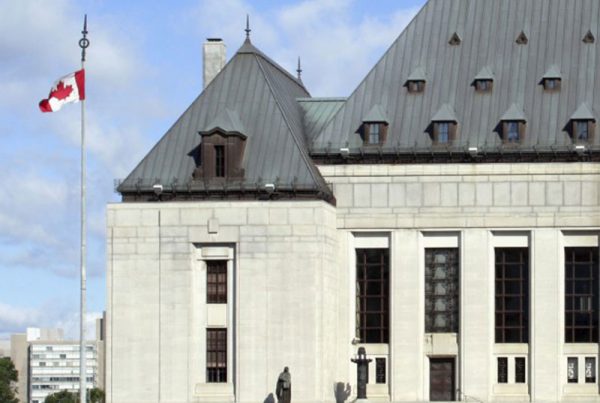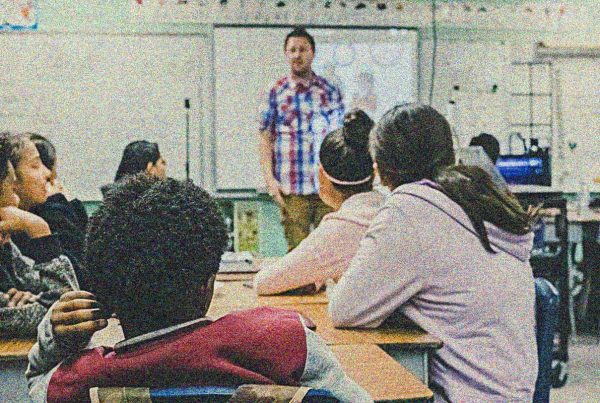August 3, 2018
CCLA believes that the 2015 Ontario Sex Education curriculum should NOT be replaced with the 1998 curriculum, as announced in the Ontario Throne Speech on July 12, 2018 (read the transcript here).
We have written a letter (reproduced below) to Ontario’s Minister of Education Lisa Thompson, in order to pose questions about the government’s decision to replace the current sex-education curriculum and to outline our views on why that decision is unwise and in violation of rights protected by the Canadian Charter of Rights and Freedom.
July 30, 2018
Hon. Lisa M. Thompson
Minister of Education
Mowat Block 22nd Flr
900 Bay Street
Toronto, ON. M1A 1L2
Email: minister.thompson@ontario.ca
Dear Ms. Thompson,
We are writing on behalf of the Canadian Civil Liberties Association (CCLA) regarding your Government’s intention with respect to the revised 2015 Health and Physical Education (HPE) curriculum, as per the July 12, 2018 Speech from the Throne, in which it was announced that:
You can also count on your government to respect parents, teachers and students by getting back to basics and replacing failed ideological experiments in the classroom—with tried and true methods that work.
It will include scrapping the failed experimental “discovery math” curricula and focus on the fundamentals that allow our children to succeed.
It will also include respecting parents—by replacing the current sex-education curriculum—with a new age-appropriate one that is based on real consultation with parents.
In particular, we are writing about the government’s decision to “replac[e] the current sex-education curriculum—with a new age-appropriate one that is based on real consultation with parents”, a file that falls within your portfolio.
The CCLA is a national non-profit and non-partisan organization dedicated to protecting and promoting the rights of all individuals in Canada. We are writing to pose several questions about the government’s decision to replace the current sex-education curriculum – at least in the first instance by reverting to the 1998 sex-education curriculum – and to share our views on why that decision is not only unwise, but also violates rights protected by the Canadian Charter of Rights and Freedoms (Charter).
The CCLA, along with other civil society associations, and in particular individuals in the LGBTQ2+ community and their allies, has serious concerns about replacing the revised 2015 curriculum with its predecessor, which makes no mention of sexual orientation or gender identity and was developed at a time before same-sex marriage was legal in Canada. Censoring this information is wrongful, in our view, as is the censoring of other important educational components of the 2015 curriculum, particularly as they concern violence and sexual violence against women. Our specific concerns and questions are laid out below.
-
Confusion for schools, school boards, parents and students
Our first concern is a practical one: other than the Throne Speech commitment, we have not seen any official step taken that clarifies for schools and school boards what materials should and should not be used in the teaching of sex education come September 2018. As the first day of school for most Ontario students is rapidly approaching, it is important that teachers and parents have access to and clarity about the curriculum that will be used this coming school year. As such, we ask that you advise us of when you or the Ministry will be taking a formal or official step to clarify the HPE curriculum and through what mechanism you intend to effect the change in curriculum. Given your announcement that the 1998 curriculum will be used forthwith, followed by contradictory statements by you in the Legislative Assembly and published reports, there is some understandable confusion about what will happen when students return to their classrooms in a few weeks. This confusion should be eliminated as soon as possible.
-
Process for curriculum development
The Throne Speech echoes published reports of the government’s view that consultation with parents that took place as part of the development of the 2015 curriculum was somehow inadequate or flawed. The Throne Speech suggests, and we understand, that the government intends to initiate a new consultation process in order to develop a revised curriculum. Indeed, we understand that you have made statements that the problem with the curriculum is not its content, but the process that resulted in its adoption. The reference in the Throne Speech to replacing the current sex education curriculum with one “based on real consultation with parents” appears to relate to that position.The CCLA believes that the government’s characterization of the pre-2015 curriculum consultation is inaccurate.With respect, our understanding is that the level of consultation that preceded the 2015 curriculum was much more extensive than is standard for curriculum development and involved more stakeholder input than any previous iteration of the HPE or any other portion of the curriculum. The pre-2015 consultation was more contemporary and comprehensive than anything preceding it.
If it is process and not content that is the government’s concern, the Government ought to keep the 2015 curriculum in place until the new consultation process is complete and any proposed changes to the curriculum have been developed. In our view, such an approach would be reasonable and would avoid the waste of resources that would presumably be expended in the re-publication and re-distribution of the 1998 curriculum. Further, in the event some hybrid of the 1998 curriculum and 2015 curriculum were to replace the latter, prior to any new consultation undertaken by the government, then the government would be guilty of promulgating a curriculum without adequate advance consultation – the very flaw it finds with the 2015 curriculum.
Moreover, while the government has announced an intention to engage in a broader consultation process on the HPE curriculum, few details have been provided to the public to explain how this consultation will proceed or what it will include.Put another way, using the language of the Throne Speech, if the government’s proposed new sex education curriculum is to be “based on real consultation with parents,” what exactly was inadequate about the 2015 consultation, and how exactly will the “real consultation” differ?We note that, typically, the development of educational curricula is a matter for experts in pedagogy and in the relevant subject matter. Indeed, Ontario established a Curriculum Council to head up curricular development over a decade ago. While there are certainly benefits to consulting with parents in relation to sex education, the views of students and educators are equally important. Subject matter experts, including public health and mental health professionals, should also be included when the subject matter is health and physical education.
We ask that you provide details on how the Ministry intends to carry out its consultation, how that consultation will differ from the pre-2015 consultation, how it will cover the same ground as the pre-2015 consultation, and how the government intends to ensure that its “real” consultation will be a transparent, open, and inclusive process. We would also like to know the government’s timeline for carrying out this “real” consultation, particularly if the status quo curriculum changes.
-
Harm to students and the requirements of the Education Act
We are urging you to maintain the 2015 HPE curriculum because, in our view, censoring the aforementioned 2015 information about sexual orientation, gender identify, and violence against women will do real harm to certain students and their families. The Throne Speech commitment, combined with published reports of this government’s criticism of the 2015 curriculum, has already caused harm by stigmatizing, degrading and alienating people on the basis of immutable characteristics and their membership in legally protected categories.The fact that there is no explicit reference to sexual orientation or gender identity in the 1998 curriculum is deeply hurtful for and stigmatizing to LGBTQ+ students and parents, who had only briefly seen their own experiences and identities reflected in the HPE curriculum.
The announced decision to stop addressing those issues leads to the conclusion that the government believes, and intends to convey through its decision, that there is something wrong or abnormal about those groups or their families – something from which other students must be protected or shielded. As you know, sexual orientation, gender and family status are all protected grounds of discrimination under the Charter. Further, Ontario’s Human Rights Code protects against discrimination based on family status, gender identity, gender expression, sex and sexual orientation.To erase those groups and their issues from the HPE curriculum would be discriminatory and wrong.Another area where the 1998 curriculum falls short is with respect to the issue of consent. Allegations of sexual assault and sexual harassment are increasingly in the public eye, and students need to be provided with the knowledge and tools necessary to make and clearly communicate sound decisions about consent and sexual activity. Because women are disproportionately affected by sexual assault and harassment, removing this element of the curriculum has a particularly pernicious impact on them and puts them at further risk.
In addition, we know that young people with physical and developmental disabilities are at a high risk of being sexually assaulted and harassed. The 1998 curriculum provides no explicit direction on teaching around issues of consent, leaving these students more vulnerable to exploitation and abuse.Removing or censoring certain content from the curriculum may also put school boards in a conflict, as they will be caught between following the Ministry’s direction on curriculum, on the one hand, and seeking to meet arguably conflicting obligations set out in the Education Act and other legislation, on the other.
For example, s. 169.1(a.1) of the Education Act requires every school board to “promote a positive school climate that is inclusive and accepting of all pupils, including pupils of any race, ancestry, place of origin, colour, ethnic origin, citizenship, creed, sex, sexual orientation, gender identity, gender expression, age, marital status, family status or disability” The government’s censoring of 2015 sex education curriculum content may make it impossible for school boards to effectively promote such a positive climate and to comply with their other legal obligations, including under the human rights legislation.
-
The Charter right to equality
In our view the government’s public commitment to revert to the 1998 curriculum is unreasonable and does not adequately consider the Charter rights that are engaged – particularly the right to equality. The Supreme Court of Canada has affirmed that an administrative decision that engages a Charter right is only reasonable if it reflects a proportionate balancing of the Charter protection with the relevant statutory mandate. In our view, there is no clear or proper objective to be advanced by repealing the current curriculum while a new consultation process is still underway or has yet to begin.
On the other side of the balance, doing so would have a clear and negative impact on the rights of at least some students and their families.We once again urge you to keep the 2015 curriculum in place pending the government’s consultation process and review. The 1998 curriculum was not developed using a better consultation process and it leaves out important information that students want and deserve. That old curriculum, which is a generation out-of-date, also does not reflect the current reality we live in, including the commitments to equality that have been reflected in amendments to the law made since that curriculum was developed. In addition, any hybrid of the two curricula would both impugn the consultations behind both processes, and concede that the pre-2015 consultation was at least partly “real” consultation.
-
Indigenous content
Finally, recent published reports reveal that the Ministry recently cancelled a planned curriculum writing session that was intended to bring more Indigenous content into Ontario’s curriculum. We have heard that this session may be rescheduled, but no concrete plans have been forthcoming, and it seems unlikely that any efforts at this stage could be adequately incorporated into the curriculum before school starts again in September. We ask that you clarify the Ministry’s plans with respect to the planned update of the curriculum to introduce more Indigenous knowledge and history.
We appreciate your consideration of the foregoing and look forward to hearing from you.
Sincerely,
Michael Bryant
Executive Director & General Counsel
Cara faith Zwibel
Director, Fundamental Freedoms Program
About the Canadian Civil Liberties Association
The CCLA is an independent, non-profit organization with supporters from across the country. Founded in 1964, the CCLA is a national human rights organization committed to defending the rights, dignity, safety, and freedoms of all people in Canada.
For the Media
For further comments, please contact us at media@ccla.org.





